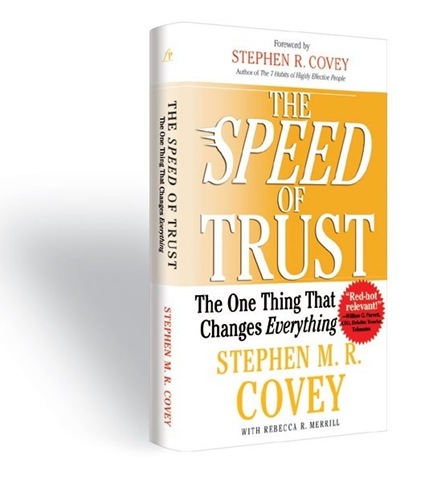 This is a review and summary of “The Speed of Trust,” written by Stephen M.R. Covey, son of The 7 Habits of Highly Effective People author, Stephen R. Covey.
This is a review and summary of “The Speed of Trust,” written by Stephen M.R. Covey, son of The 7 Habits of Highly Effective People author, Stephen R. Covey.
Trust is not just a touchy-feely concept, it is a vital component of any viable business relationship. Covey says, “Nothing is as fast as the speed of trust.” Nothing better accelerates a transaction, a task, or project, than trust. When there is a high level of trust between parties in a business transaction, deals can be made in minutes with a handshake, yet many organizations are dysfunctional and inefficient because of low-trust cultures. In a high-trust situation, you can fumble your words and people will still stay with you, follow your true meaning. In a low-trust relationship, you can be incredibly precise and others will find a way to twist your words against you, misinterpret your meaning, find or invent hidden threats, distort your intent.
Trust is not a simple concept: Among other things, trust requires alignment of values and a clear understanding of expectations. Trust can be lost when bad results are created via poor execution and compounded by inadequate communication, no matter how lofty the intentions or noble the character.
Trust is the “hidden variable” in the formula for organizational success. The old paradigm was that Strategy x Execution = Results. The new paradigm is that Strategy x Execution x Trust = Results.
Trust always affects two outcomes: speed and cost. When trust goes down, speed goes down and cost goes up (such as the time/cost of airport security post 9/11, or the expense of Sarbanes-Oxley Act compliance as a result of Enron, WorldCom, and other corporate misdeeds.)
The reverse is true as well: When trust goes up, speed goes up and cost goes down.
Covey states that trust requires both character and competence, laying out “4 Cores of Credibility”:
– Integrity
– Intent
– Capabilities (your intentions may be of the highest order but if you lack the ability…)
– Results (valiant effort is great and perhaps a good indicator of whether another try is worthwhile, but in the final analysis it’s performance that counts)
Five waves of trust (Covey uses waves in the sense of an outward-moving ripple)
– Self trust based on credibility (we keep the promises we make to ourselves; hard to truly trust others if do not trust self)
– Relationship trust created by trustworthy behavior
– Organizational trust based on alignment of stated values and actual behavior
– Market trust based on reputation and track record
– Societal trust based on contribution and the social contract
13 behaviors that establish trust
– Straight talk (say what you mean, mean what you say)
– Demonstrating respect (people crave respect and acknowledgement; give it!)
– Transparency (hiding things creates mistrust, openness creates trust)
– Righting wrongs (don’t say you are sorry, behave sorry)
– Show loyalty, particularly to those not present
– Get better (show your commitment via continuous improvement; results create credibility)
– Confront reality
– Clarify expectations
– Practice accountability
– Listen first (“Seek First to Understand, Then to be Understood”)
– Keep commitments (model the desired behavior, walk your talk)
– Extend trust (creates reciprocity; extend conditionally to those earning trust, abundantly to those who have established trust)
Reflect upon those you have met in life who either have gained your trust or lost it. What did they do? Not do? Do any of those behaviors apply to you? Hold lessons?
Who trusts you? Why? Who distrusts you? Why?
Covey says “trust changes everything.” Do you agree? Are there areas of your life, professional or personal, where you could proactively create more trust? Will you?


0 Comments